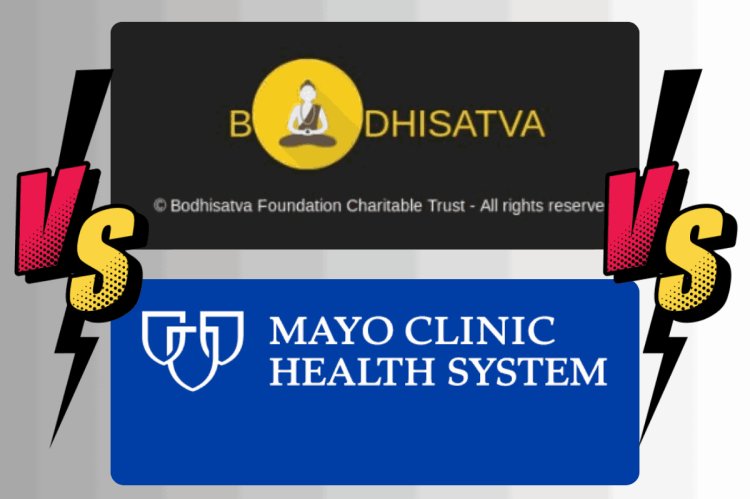Mayo Foundation for Medical Education and Research v. Bodhisatva Charitable Trust.
This legal case, Mayo Foundation for Medical Education and Research v. Bodhisatva Charitable Trust (2023 SCC Online Del 3241), decided on 29-5-2023, involved a trademark dispute between Mayo Clinic, a leading medical center, and Bodhisatva Charitable Trust. Mayo Clinic alleged that the trust fraudulently used its trademark 'MAYO' in healthcare and educational services. The court, drawing on precedent and considering the relatedness of services, found in favor of Mayo Clinic, granting a permanent injunction against the trust's use of the disputed mark.

Mayo Foundation for Medical Education and Research v. Bodhisatva Charitable Trust.
2023 SCC Online Del 3241.
Decided on 29-5-2023
Brief Facts
The Plaintiff, Mayo Clinic, a leading medical centre, owns the trademark 'MAYO' and discovered the defendant Bodhisatva Charitable Trust was fraudulently using it in 2014. In 2020, they found out the trust was still using the trademark. A report by an investigator revealed that the trust was using the trademark on display boards, prescription slips, and invoices, as well as on their websites and social media platforms. Mayo Clinic filed a lawsuit seeking a permanent injunction against the trust for trademark infringement and passing off.
Plaintiff Arguments
The plaintiff is a subsidiary of the Mayo Clinic, a renowned charitable organization in the USA. The Mayo Clinic is a leading medical center that provides clinical, educational, diagnostic, and research services through a diverse team of physicians. The plaintiff owns and operates campuses under the trade name 'Mayo Clinic' and is the owner of the 'MAYO' trademark and other MAYO-related trademarks in various classes, including classes 16, 41, 42, and 44, with a registration for the wordmark 'MAYO' in India since 1992. 'MAYO' is also the plaintiff's house mark and the dominant part of its trading style and website domain names, including www.mayoclinic.org, www.mayo.edu, and www.mayoclinic.com.
In the year 2021, the plaintiff hired an investigator to look into the matter of the defendants using the plaintiff's registered mark 'MAYO.' The report revealed that the defendants were using the plaintiff's mark on display boards, prescription slips, OPD slips, invoices, trade names, business concerns and even on their websites, www.mayomedicalcentre.com and www.mayoschoolofnursing.com. They were also advertising their healthcare and medical education services on social media platforms and third-party websites under the name 'MAYO.' As a result, the plaintiff has filed a lawsuit seeking a permanent injunction against the defendants to stop them from infringing on their registered trademarks and engaging in passing off.
Defendant Arguments
Defendant 1, Bodhisatva Charitable Trust, is a non-governmental organization established in 2000 under the Indian Trust Act, of 1882. The trust is focused on disseminating education in the medical field and providing help for medical and surgical treatment. The trust operates Mayo Institute of Medical Sciences (Defendant 4), Mayo School of Nursing (Defendant 5), and Mayo Hospital (Defendant 6). Defendants 7 and 8 are the trustees of Defendant 1.
The plaintiff became aware of Defendant 1's dishonest adoption of the trade mark 'MAYO' in 2014 and issued a legal notice in that regard. Defendant 1 had filed a trademark application for the device mark, in Class 41 relating to 'Institute for Medical Sciences and Educational Services.' The plaintiff opposed the application by filing an opposition in 2016, and the said application stood abandoned by the order of the Trade Marks Registry.
In 2020, the plaintiff discovered that Defendant 1 continued to use the trademark 'MAYO' in relation to healthcare and educational services.
Court Decision
In 1992, the plaintiff obtained the word marks "MAYO" and "MAYO CLINIC", as well as the device mark "MAYO", registered under Class 16. This class dealt with "periodicals, medical or other journals, printed matter". At that time, only Classes 1 to 34 were available under the Trade Marks Act, 1999 in India. The plaintiff could not obtain registrations under Class 41, which deals with educational services, or Class 44, which deals with medical and health care services, as they were not available. Therefore, the plaintiff obtained registrations under Class 16, which was the closest to their activities.
In a court case, Renaissance Hotel Holdings Inc. v. B. Vijaya Sai, (2022) 5 SCC 1, the plaintiff had registered their trademark 'RENAISSANCE' under Class 16 for printed materials, periodicals, books, and Class 42 for 'hotel, restaurant, catering'. The defendant was using the mark 'SAI RENAISSANCE' for hotels. The Supreme Court ruled that the defendant's adoption of the mark for hotels would infringe on the plaintiff's registrations under both Classes 16 and 42.
The court also stated that 'hospitals' and 'education services providing courses of instruction in medicine and health care' are related to 'medical journals and periodicals', as they all relate to the healthcare and medical education sector. Since the defendant was using identical marks for services similar to those of the plaintiff, it was likely to cause confusion in the public and show an association with the plaintiff's registered trademarks. Therefore, the court held that a prima facie case of infringement under Section 29(2)(a) of the Trade Marks Act, 1999 was made out.
The court found that the defendant's use of the mark 'MAYO' in 'MAYO COLLEGE' was not relevant to healthcare or medical education. The court held that there was a prima facie case of infringement and passing off made out by the plaintiff, and the balance of convenience was in favour of the plaintiff. The defendants were restrained from using the plaintiff's trade mark/name 'MAYO' or any mark/name deceptively similar thereto, in any manner.
Court Analysis:
The court ruled in favor of Mayo Clinic in the case against Bodhisatva Charitable Trust for infringing on its trademark 'MAYO' in healthcare and educational services. The court relied on a previous case and held that using identical marks for similar services would cause confusion and create an association with Mayo Clinic's trademarks. The court granted a permanent injunction, prohibiting the defendants from using the plaintiff's trade mark/name 'MAYO' or any mark/name deceptively similar thereto in any manner.












